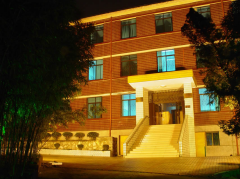Head: WANG Shijie(Professor)
Vice Heads: FENG Xinbin(Professor), YIN Zuoying(Professor), XIAO Tangfu(Professor), XIAO Huayun(Professor)
1. Basic background
Environmental Geochemistry is a new and developing subject on the basis of the combination of geochemistry and environmental science. The first environmental geochemical work, which was carried by the IGCAS in 1968, is the environmental survey in areas of endemic diseases and the study of their geochemical causation. The first Division of Environmental Geology in China was founded at the IGCAS in 1974. In 1989, the Sate Key Laboratory of Environmental Geochemistry was founded, and was officially approved by the state authority in 1995. 
2. Research orientations, objectives and contents
The researchers of the SKLEG mainly study the transporting and cycling behaviors of chemical elements and their isotopes, released by the natural and artificial processes, and their impacts on the ecological environmental system. Particular attention is paid on the studies of biogeochemical process and mechanism, and environmental geochemical modeling in macro scale. All the studies are to reveal the variation regularities of geochemical environmental system and the percentage of the impact caused by the natural and artificial processes respectively on the changes of environmental quality, and finally to provide theoretical supports and technical consultations for rational utilizing land and mineral resources and conserving ecological environment. Following the research themes of “environmental process-evolution-effect”, the researches of the SKLEG have obtained many important achievements in the fields of the environmental geochemical processes and the environmental quality variation, the environmental geochemical records and the prediction of environmental quality variation, and the relationship between geochemical environment and human health. 21 prizes which were awarded by various provincial, ministerial and state authorities have been obtained by the SKLEG for its various research achievements. Various kinds of research projects have or having been undertaken. They include the National “973” Projects and the National Climbing Project funded by the Ministry of Science and Technology, the Major Projects, the Key Projects, the Distinguished Young Scholars Projects and the Normal Projects funded by the National Natural Science Foundation of China (NSFC), and the Major Projects and the Key Projects funded by the Chinese Academy of Sciences respectively.
3. Operation and administration
The head of the SKLEG is in charge of its operation under the principle of “opening, communication, collaboration, and competition” and the administrative model that the job positions are set depending on demands and competition. At the end of 2005, there are 36 staff researchers (including 10 supervisors for PhD students), 8 technicians, 2 administrators, over 120 graduate students and post-doctoral research fellows. On the basis of the tenurial staff reviews and the demand of the key research orientations, A certain number of vacant positions are kept for attracting outside excellent researchers in order to advance the communication of staff members in the SKLEG. Following the development orientations of the SKLEG, a large number of domestic and international collaboration projects have been undertaken. The “Opening Foundation of the SKLEG” is set up for applications of possible collaborators.